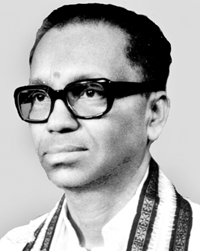
Afflicted King’s Battle Roar: Celebrating the Legacy of Mahakavi Dasharathi Krishnamacharyulu
Hyderabad, July 22: Today, we honor the birth anniversary of the great poet Dasharathi Krishnamacharyulu, a luminary who brightened modern Telugu literature with his self-respecting poetry. Known for his fiery verses and unyielding spirit, Dasharathi’s heart was an iceberg and his poetry a fire pit.
Dasharathi Krishnamacharyulu, born in 1925 in a traditional Vaishnava family, broke through caste and religious restrictions, moving forward on a progressive path inspired by the spirit of armed revolutionary struggle. He roared like an erupting volcano during the liberation movement, using his powerful poetry as a weapon against oppression.

In the company of organizations like Nizamandhra Mahasabha, Hyderabad State Congress, and the Communist Party, he defied the tyranny of jagirs and zamindars and the brutality of Razakars in the Nizam kingdom. At just twelve, he began composing sharp poems against the Nizam’s dictatorial regime. Dasharathi fearlessly recited his poetry amidst threats and adversities, showcasing his unyielding dedication to the cause.
Dasharathi dedicated his literature to the pursuit of an ideal society, free from tears and suffering. He excelled in various literary forms, including poetry, song, text poetry, translation, and rubai. Like a geographer exploring uncharted territories, Dasharathi vividly portrayed the natural, geographical, and cultural splendor of his region in his works, proudly expressing the glory of Telangana.

Dasharathi’s direct participation in public struggles infused his literature with a unique power. He focused on the special problems of different social strata, warning of the dangers of caste divisions and advocating for equality. His poem “Neeli Ravva,” inspired by James Meredith, the first African American graduate of the University of Mississippi, highlighted the universal struggle for justice and equality.
In his poetic style, Dasharathi celebrated the multifaceted glory of black people, portraying them as knowledgeable, peaceful, and resilient. He promoted inter-caste and inter-religious marriages as a means to combat casteism and emphasized the importance of respecting women for national development.

Dasharathi preached the principles of Buddha’s equality and justice in his works “Mahabodhi” and “Maha Parinirvanam.” He questioned societal values and norms, urging a reawakening of human conscience.
With his unparalleled artistry, Dasharathi transformed Telugu poetry, incorporating democratic ideologies and aesthetic expressions. His verses captured the victory of public struggles with symbolic sophistication, glorifying a free India.
Dasharathi’s literary prowess was further enriched by the flavors of the Urdu language. His use of metaphors like “Tamovriksha” (tree of darkness) and “Ashru Dipikalu” (teardrop lamps) showcased his poetic brilliance. He celebrated the Telangana dialect in his works, bringing its unique beauty to the forefront.

Dasharathi also recognized the contributions of contemporary poets, praising the likes of Mahakavi Joshua, Makhdoom Mohiuddin, Kaloji, Vattikota, and C. Narayana Reddy. He predicted the realization of the dream of a separate Telangana state, a vision that has now come to fruition.
Today, as we enjoy the fruits of a special Telangana state, Dasharathi’s poetry remains eternal, a testament to his enduring legacy. His unwavering spirit and literary genius continue to inspire generations, making him a true public poet of unparalleled creative talent.



